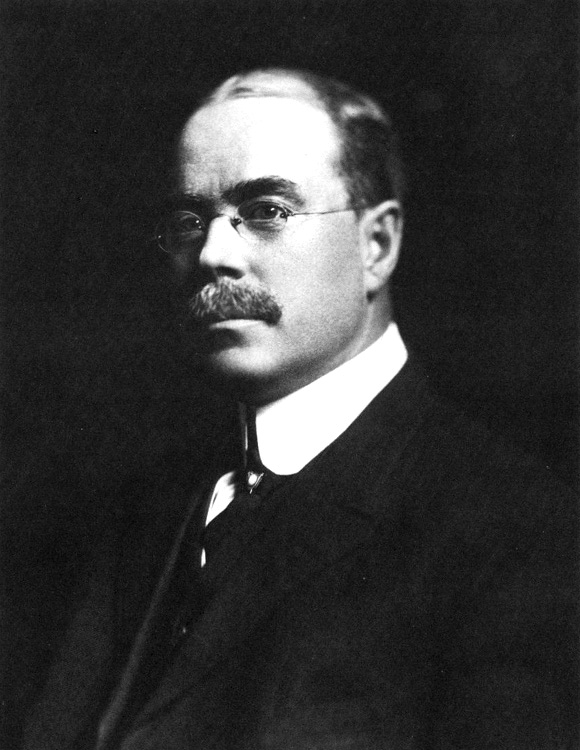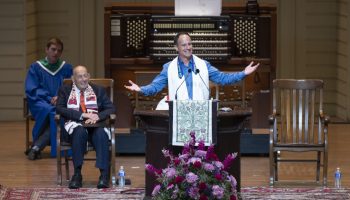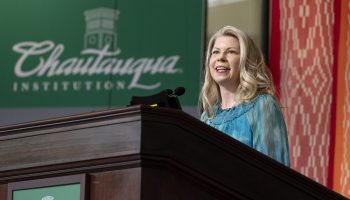As Chautauquans this week have addressed the topic “A Crisis of Faith?” by exploring the juncture of religion and social justice, it is important to remember that Chautauqua Institution, from its inception in 1874, was at the vanguard of a new kind of thinking about how faith can inform and improve people’s everyday lives.
Most of us are familiar with the vision of John Heyl Vincent, who, with the industrialist Lewis Miller, founded the Institution as a place where religion, education, recreation and the arts came together as a locus of a spiritual community. But many do not know that two of America’s most brilliant and daring theologians spent many years here preaching, teaching and using Chautauqua as a testing ground for what were then radical ideas that eventually became the backbone of modern spiritual thought.
At 3:30 p.m. Friday in the Hall of Christ, the Rev. Ross Mackenzie, the first full-time director of the Department of Religion here and, later, the Institution’s historian, will discuss the impact of William Rainey Harper and Shailer Mathews — with a focus on the latter — as part of the Oliver Archives Heritage Lecture Series.

Harper was born in New Concord, Ohio, in 1856 and entered Muskingum College there at the age of 10. He earned his bachelor’s at 14 and went on to get his Ph.D. from Yale University at 18. He taught at Yale and Denison University for years before John D. Rockefeller tapped him in 1891 to be the first president of the newly reconstituted University of Chicago, where he served until his death in 1906. In 1883, Vincent heard Harper speak, and he invited the prodigy to teach Hebrew and religion at Chautauqua. For the next 15 summers, Harper taught at the Institution, becoming principal of the College of Liberal Arts here in charge of all education at Chautauqua.
“I had all I could do to keep Dr. Harper from swallowing up the whole thing,” Vincent said of his young protege.
Harper, in turn, hired a young Baptist theologian named Shailer Mathews to teach at Chicago.
In 1912, Mathews followed in Harper’s footsteps and became director of religious work at Chautauqua, a position he held each summer until 1934. He was a major figure in the development of the Institution and was also a longtime trustee.
Mackenzie was born and raised in Edinburgh, Scotland, and was ordained in the Church of Scotland and taught theology at the Union Presbyterian Seminary in Richmond, Virginia, for 17 years.
In 1989, he became the first full-time director of religion at Chautauqua, a position he held for 10 years. In 1999, he became the Institution’s historian.
He became interested in Mathews when he and his wife, Fiona, first visited Chautauqua.
“Fiona and I arrived at the Hall of Missions and we saw this bas-relief of Shailer Mathews,” Mackenzie recalled this week in the parlor of Presbyterian House, across from the Amphitheater. “I’d heard of his name, of course, but knew little about him except that he had been dean of the school of divinity at Chicago. My own field was early Christian history. The more I studied him, the more I liked him.”
Mathews was born in Portland, Maine, and received degrees from Colby College. He became a well-known liberal theologian and champion of the Social Gospel movement, a controversial interpretation of Christianity that took root at the turn of the 20th century.
“Mathews’ philosophy was based on two pillars,” Mackenzie said. “Modernism, the taking of a historical and scientific approach to religious knowledge, and the Social Gospel, which focused on the question ‘How do we apply the teaching of the gospel to the political, economic and social issues of the day?’ The Social Gospel was founded on two pillars: seeking justice and loving mercy.”
Mathews identified what he considered the four most pressing issues of his time: poverty, immigration, women’s rights and war; issues that, of course, remain pressing today.
“It is not enough to take people out of the slums; we must cleanse the slums,” Mathews preached from the stage of the Amphitheater in an early appearance in 1912. “We preach Jesus as comfort, and Jesus preached discomfort. … The Gospel is a disturbing element in society. The message of the Gospel is the changing of social conditions.”
Such proclamations were considered wildly controversial by most Americans at the time, although they echoed the messages of Jacob Riis and Jane Addams. The prominent fundamentalist Reuben Archer Torrey condemned the Divinity School at Chicago as “a hotbed of radical theology.”
This criticism did not dissuade Mathews.
“We are experiencing a new reformation in which the methods of the modernists are being carried into religion,’’ he told Chautauquans in July of 1923. “Religious formulas that are not needed must be given up.”
Six days later, he preached: “People today are wanting practical religion that will be workable to the benefit of their fellow human beings.”
“By the time Mathews left Chautauqua, in 1932, the modernists had prevailed over the fundamentalists in the teaching of theology in America,” Mackenzie said.




